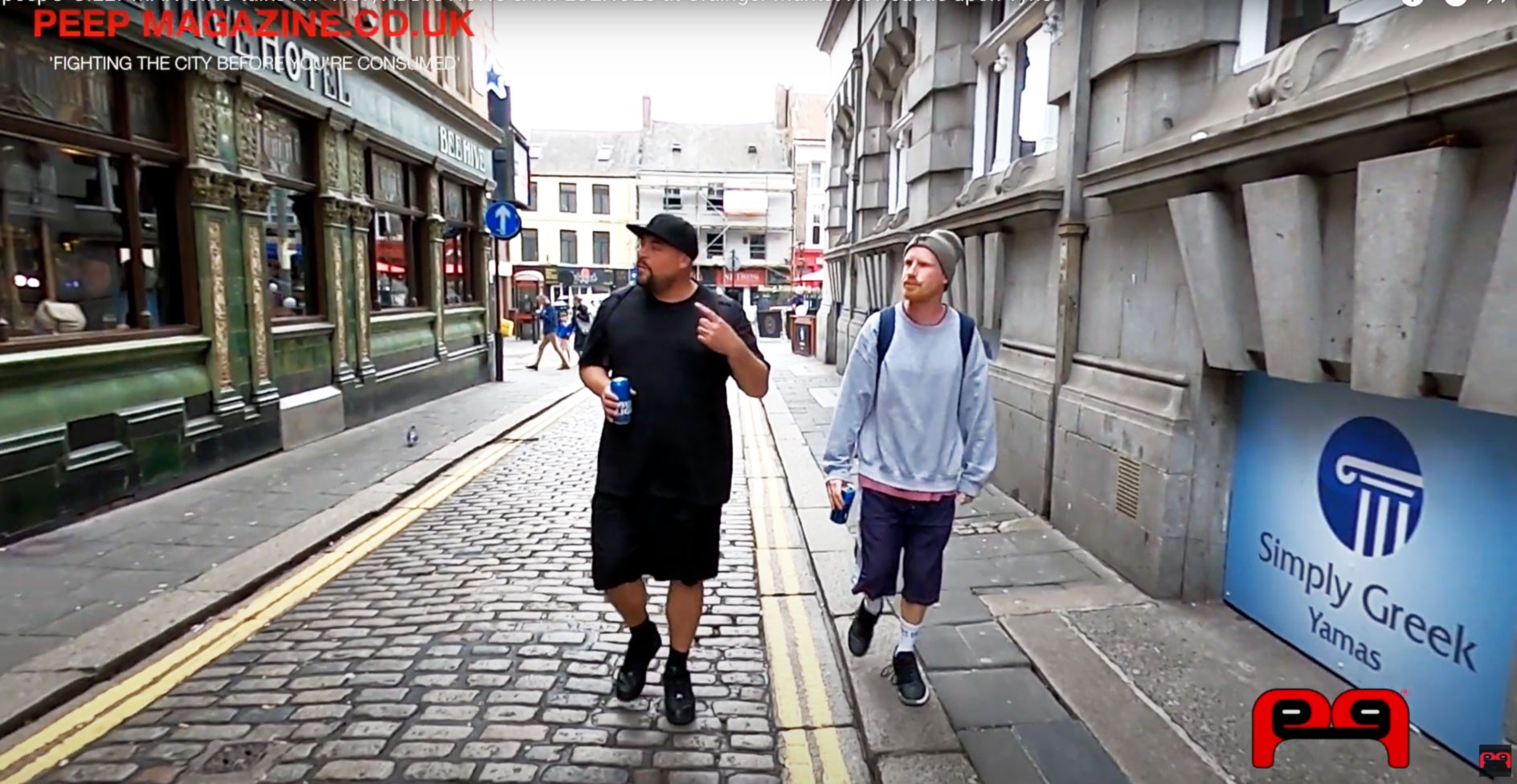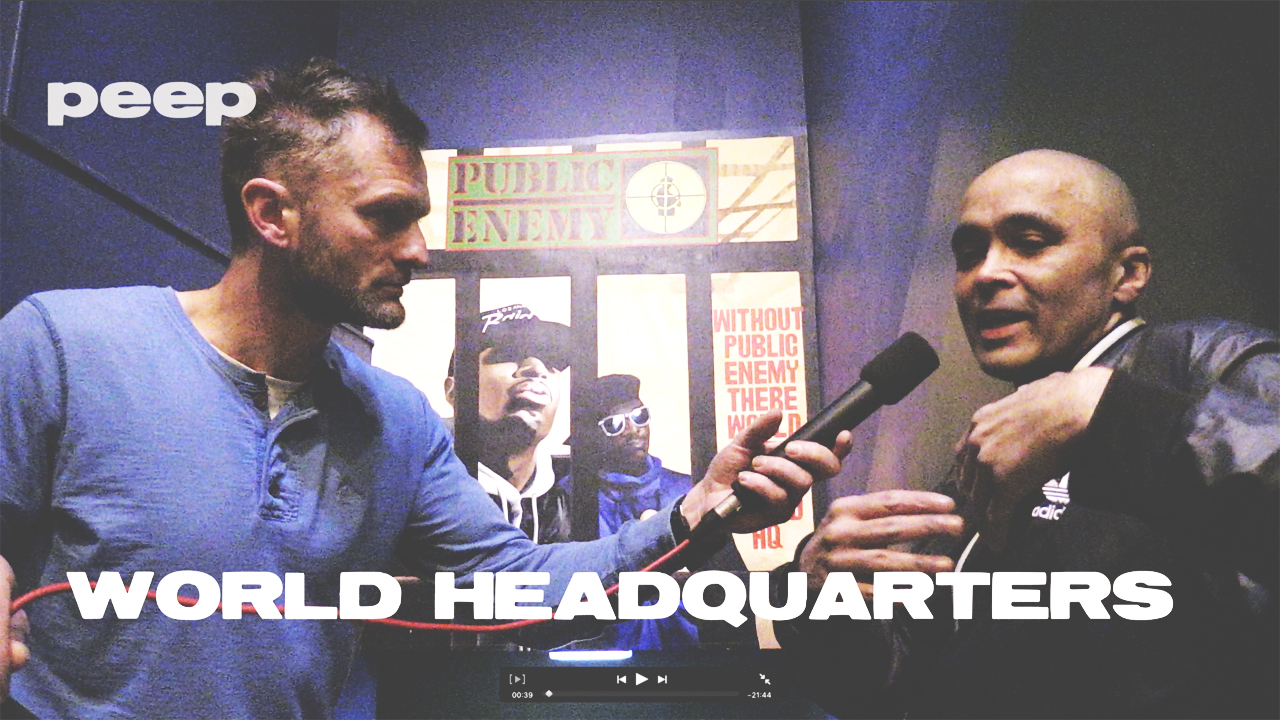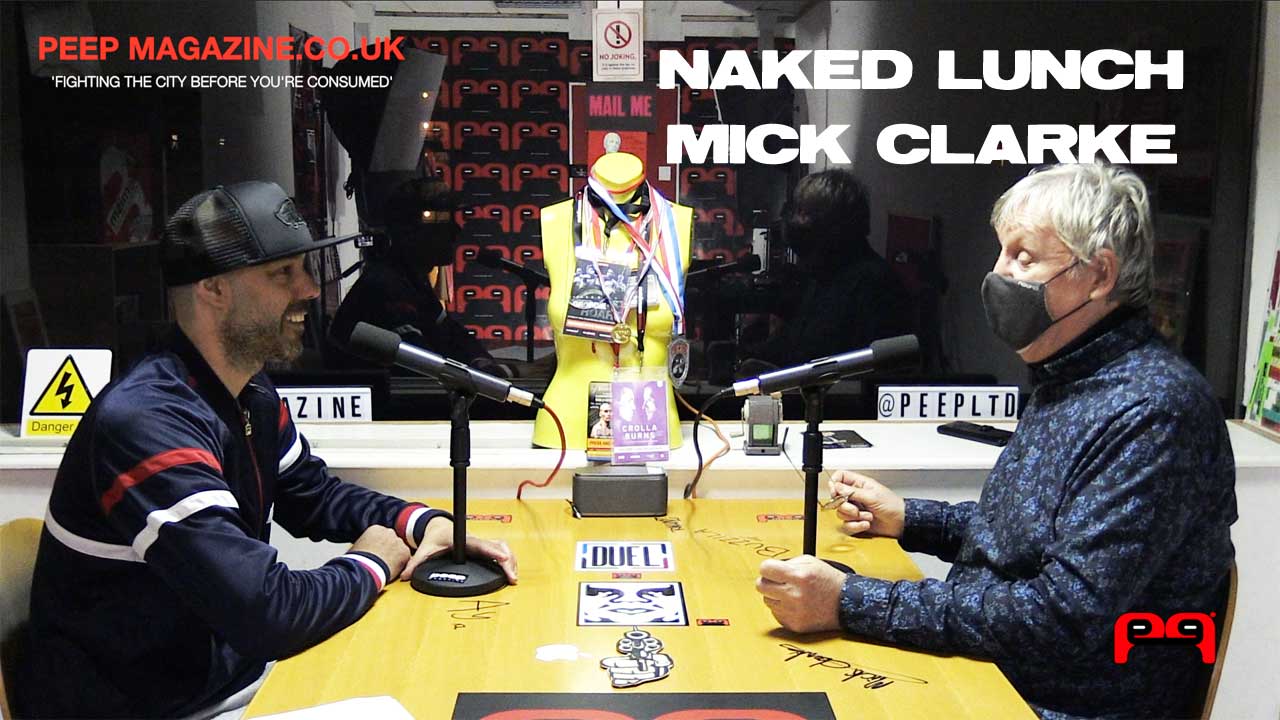Music photographer ‘Normski’ chops it up about Hip Hop photography, photojournalism and urban culture with peep.
peep magazine
Normski – real name (Norman Anderson) Before we get into the music photography book –The Man With The Golden Shutter’ you have been an inspiration to me over the years, and I’m not just saying that. I don’t say that to to everybody, but I used to watch Dance Energy and Deaf 2 back in the 90s. I’m gonna be ‘real’ right, I never realised that you were a professional music photographer

Normski
Okay, well that’s fair enough. Funny enough, I was a music photographer until the Dance Energy program appeared in 1991 and even when I got the job as a presenter, I actually went to meeting with a couple of producers and the original writers of the production company that came up with the idea. I went there as a Hip Hop photographer, and I was told about this new show that was coming to BBC2 and that I should actually go down there because there was maybe some photographic or photojournalism work available for you.
It was weird that I got it you know, I got in the meeting and presented my urban music photojournalism to the ladies from Diverse Productions TV, and they were just ‘gob smacked’ with the pictures I had taken. They both asked me, had I ever thought about being on the other side of the camera, and I was like, well no not really, that kind of thing, and why would you say that.
I’m A Music Photographer
I said, I was hoping that you know, you’re gonna ask me to join the TV show and take photographs. They both explained that I had an amazing music photography portfolio and you seem to know everyone and you’ve got really good vibes you know.
Normski
I never even thought about it though, when I look back at that – I think that skills and what I guess the energy in the vibe they felt was what I was gaining as a music photographer and was like you know, put into a different environment with people. I don’t know, I had to kind of convince them that I wasn’t gonna mess up taking their pictures on it. So, there’s a whole lot of social and relationship lessons I had learned as a young photographer, that when it came just sitting down and talking about you know, taking photography pictures and being on production and being on the set, you know, which I’ve done some stuff on previous shoots, I was at home with it.
So all these years later, which is you know, three decades later, I’ve got a book out called ‘The Man With The Golden Shutter’ but it’s amazing how many people actually didn’t realise that I did music photography. It was actually the photography that led me into music television in the first place, as I was a music photographer, and this was another stepping stone of my career and evolution if you like, things that I would try throughout my life if photography.
I was a drummer and a band, yeah well you know it’s mad isn’t it? because, I don’t think you can ever possibly know everything about me, even I find that stuff about me. I find that stuff but I don’t remember doing it, that you know.
We were talking about wearing different hats and using different heads. I’ve had to mix it up, but it’s quite obvious that people see a lot more than just a music photographer or ‘just’ a DJ. I would turn up to gigs, and people would say have you brought your camera. I would say, I’m NOT taking pictures, I’m playing as a DJ tonight. I would turn up for gigs and people would say, “are you bringing your camera”. I would be like, no I’m Djing !! I think that you know, some are like you know, creative arts especially music and image, they go ‘hand in hand’ and so you can be two or three things at any one time anyway.

Don’t Be A Specialist, Be A Generalist
peep
Outside of the bridge Hip Hop festival here in Newcastle upon Tyne, we’re having a little bit of chat outside ‘off camera’, and we’re talking about “ Don’t be a Specialist be a Generalist “
Act Local And Think Global
Normski
I love that. my saying was – coming from a small unit that wanted to go large, we came up with “Act Local And Think Global”
peep
I love that as well, so we both came away from something. Yeah, I’m gonna say that and hopefully you’ll say mine, although I never made that up.
Normski
no, no I like that – “ Don’t Be A Specialist Be A Generalist”
I get it, you know but you could be a specialist at a lot of things. What’s that other saying ? “Jack Of All Trades And Master of None”. That doesn’t really come true now, well, some people are “jack of all trades” and they are master of none actually, but then you get some people like me, that is “Jack of all trades the master of all trades”.
peep
I don’t want to go down the road of when you picked up the camera, because you have probably heard it all before.
Sir Horace Ove Was An Inspiration To Me
I was interested to hear that your inspiration was the British filmmaker – sir Horace Ove. Horace, was a black filmmaker with themes of black britishness and black identity within the British film industry, producing films such as ‘Pressure’ which was an iconic portrait young black men facing severe racism in 1980s London.
Normski
I think I was of a time when black creatives were going to make a huge impression in history. In our early years you know, Zak Ove, who was my school friend, and very good oldest friend, his father, Horace Ove who placed the cultural and creative stimulus into Zak Ove, and so anything that when I was into which was drama and playing music so was was Zak. There are a lot of you know, black historical essences, but roots really, that I would have seen and would became much more visible with my friendship with Zak, because of being around Zak and Horas, I was around actors, I was around film people, I was around music and cultural activist and political minded people. Coming from a Jamaican household that came to the UK near late 50s and early sixties, we all arrived here at a time of change.
Normski Built His Own Darkroom
So, whatever we were going to do was always going to be new. And, fortunately, you know I thought that you know the quite a few people including Zak’s family that helps guide me and also back my interest. So my mother and my father, one day, when they came back from work, knowing that I had a new hobby which was photography, knowing that I was really into it. They then seen some darkroom equipment for sale and came back and told me about it. This was the moment, you know, as a twelve or thirteen year old kid this was a moment in my life when I knew what I wanted for Christmas and it wasn’t a toy or bike. When I got my first camera, I did actually go to get a bike and I had no interest in photography whatsoever, but then the bike was gone so I bought a camera instead.
I have to thank my mum especially, but all of my family have always backed this one thing that Norman Anderson ( Normski) wants to do, because I was really good at it. I got into college early because I had shown photography skills. I got in just underage, so I did a year of college perfecting laboratory skills and that was all before my 17th birthday
peep
Were your parents quite supportive with your photography, see, I’m really pleased to hear that because you don’t hear that a lot, well, especially back in the day.

Normski
Yeah, they were because you know, I mean we built and adapted a cupboard that had no running water into a photography Darkroom, so I used to run between that cupboard and bathroom, which is a whole hallway with the front door one two three more doors, no, I lie, there was so many drawers off that hallway, so I would have been quite intense about the keeping the dark and keeping everything closed, which meant that I would have to be in a darkroom and people were not in. I had brothers there’s, four, of us living in the house, so there was you know, so I would be basically be printing at night when everyone else was in bed at night. This is when I was in the dark room, and you know, I’m sure Mum never said anything about it, but the dripping of the water, washing the prints all night long with the water, it did not stop dripping when I went to bed until maybe two or three o’clock in the morning. I would have to hang the prints up so that they wouldn’t you know, something use a bath and they have prints hanging in on the line it was ridiculous but they put up with that for years – “that was support”
Me begging for money that didn’t come so hard and fast as we didn’t have a lot of it, so I had to learn how to go and earn money, so I did odd jobs and stuff.
I actually got a part-time job that turned into a full-time job in the London Rock Shop, which was a pretty cool music shop in Chalk Farm right by Camden Lock right by Dingwalls. The was a hot place be, which was where I lived when I was growing up, so I was surrounded by all of this.
Music and art and cottage industries and the ‘DIY community’ kind of life, very social and everything was like, a lot of things were like youth clubs, community centres, so a lot of my early interests in Music photography were doing things locally, you know, taking pictures locally, and then someone saw me with a camera and they said “would you like taking pictures of things” an I was like, oh yeah, I gave it a shot, I messed stuff up, and was not sure whether I should be doing this… I would see the disappointment on peoples faces, when the faith that they put in me and they didn’t come out at all good , but I persevered.
Peep
Correct ISO, F-Stops, Shutter speeds. . . .
Normski
yeah well, most people now have no idea, being of a time when it was ‘filmed’ you know, you could easily mess up the role of film or you could just have on the wrong setting for a whole lot, you couldn’t look at the back to see if it was bright or dark.
peep
Some people even left the camera lens on the camera !
Normski
What is mad now tho, you can take a picture on any camera phone and you will get a good shot straight away. It’s all ‘Idiot Proof’ people won’t be happy until they get a good shot or some kind of result. So, the sort of skill technique that I learned, in a way, it doesn’t need to exist as much now, but actually when you have that skill you can tell because, you know I can tell. I can now take a picture of anything and it will look great because I have that skill.
I know what I’m looking for , just from playing around for years learning how to develop film in my own darkroom and then going to college for a year. When I went to college, I couldn’t wait for that one year to be finished, because I just wanted to go and work. I actually wanted to go and do photography. Right in the middle of the course, I wanted to just go and work, so the last half of the course I did not remember because I was already fixed on starting to do this dark room stuff for other people, printing for people, because I had a darkroom. There’s an old school friend of mine I found that many years later, she said I was the only person when we were growing up that had a ‘Darkroom’. That was like a major thing. I never ever thought that, because I didn’t have anything else. I never had a bike, all I had was a darkroom and anything else that had something to do with camera equipment.
All my money went into that. I had roles of paper, a second hand external flash from this other photography, which nearly blew me up, clearly nearly electrocuted me about three or four times. . .
peep
it’s like the foundations of nurturing your craft.
I Was A Hobbyist And Model-Maker
Normski
Well yeah, I mean I was kind of a ‘hobbyist’ kind of kid. I did a lot of things like model building, working with borsenwood you know, let’s try that yeah. I was very much into the mechanics. I guess, even when I went to college, with that course I did, which was a day Tech in the Certificate of Photographic laboratory skills, it gave you an inroad into all of the things you would need to learn, so that you could definitely go and work in a photography lab on a London High Street like ‘Snappy Snaps’ or something like that.
I knew how to use those machines, quick colour processing and you actually hand colour printing and black and white printing. We then did film as well, we did art and design, which all these things in this course that combined photography and on these other elements. I’ve always been that ever since, so you know, it’s not just being the photographer and even tho, you know, I think about what even being into DJing music etc. I do like the equipment, I like the bits you have to get, like the accessories and everything.
I never collected football cards, but I collected 35 mm slides. You know, in those days you learned about roles of film, 36mm film or 24mm film. And, you know, you know you’d have to be pretty particular about how you shoot. Now, I’ve got 2,000 shots in the digital camera, and every now and again I try to be particular about it, but the other day I was shooting, I wasn’t, I was just snapping away shooting away, like it was just a roll of you know, movie camera film.
I looked back at the results, and they were not as tight as I wanted them to be, had I been a little bit more one at a time, slowly. I think there’s another thing that you have to take your time with stuff, you are much more sensitive and much more careful, so yeah, so that’s how I learned – being sensitive and careful and then once you’ve got that rule you know, you can go and tear it in half can’t you.
You can go beyond the bar line and you learn a whole different set of chords if you like. I’m speaking musically, but I kind of combine that feeling of that’s what it is isn’t it, it’s just layers seeing depths of field depths of focus, different shades and it’s endless and infinite. You could you re-educate the mind by saying, you know a piece of white paper and just put one black line on it and the brain will start seeing all kinds of stuff, so I found that very interesting with photography because it really was a brilliant way to make sense of the imagination.
peep
Jazzy B’ once said “It’s all about expression” do you think this still resonates today, as an artist, with the young kids coming up, is it still ‘all about expression’.
Normski
yeah absolutely, I think that everything about life you know, it’s like a flower if it doesn’t flower, then it’s unable to express its inner self special power, and, or it’s maybe not that’s maybe not what it’s there for, but I think as an artist definitely. It is all about expression and it’s also all about believing in yourself and having passion for your your interests and what you feel your messages are and what your trying to share with the world.
Often, I think of not doing stuff because of you know, society’s questions of should I be doing this and it’s okay to do this with photography. Now, the power of photography, it’s not as easy to just go up and just take their picture in the street. You can’t really do that by law. . .
You would never really exploit them but there was always a little look of kind of why you doing that? Now you get some people with the camera and they go full on into ‘super pose’ mode or ‘rage mode’ because they immediately think your going to market them or make money from them, but then get missed out on the historical value of the human race when you do a book like mine that documents life at a particular time.
Music Photographer Book With Normski – The Man With The Golden Shutter.
Music Photographer Book – The Man With The Golden Shutter By ‘Normski’. At this point, peep needed to speed things up as Normski taxi cab was about to arrive and was definitely on its way to The Bridge Hip Hop Festival event here in Newcastle upon tyne, Higham Pl, Newcastle upon Tyne NE1 8AF. We quickly browse Normski’s music Photographer book – The Man With The Golden Shutter and focus on key pages such highlighting Caron Wheeler, Ice-T, Goldie and ‘Method Man’. we browse through icons and pioneers of music within both British culture and American Hip Hop culture as a wider art form. If you would like to watch my interview with Normski please follow this link Normski The music photographer in London or Listen to the interview on the peep podcast audio exclusive interviews






